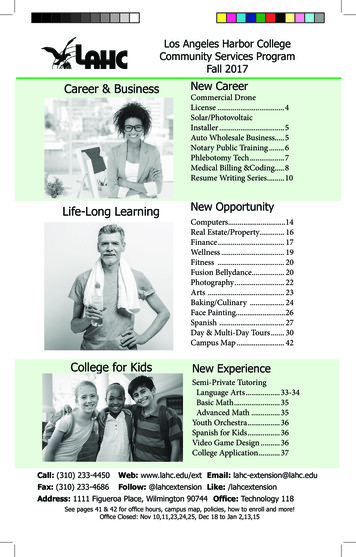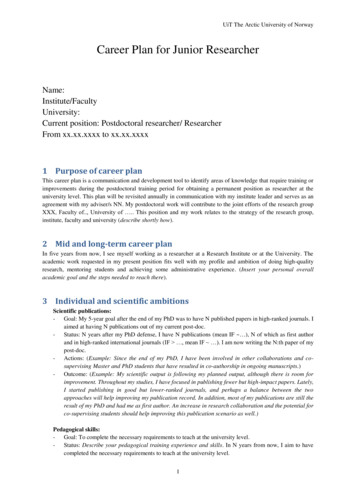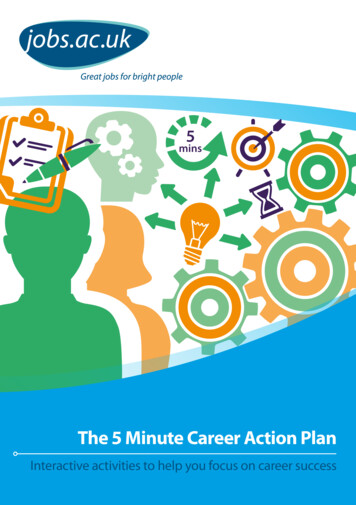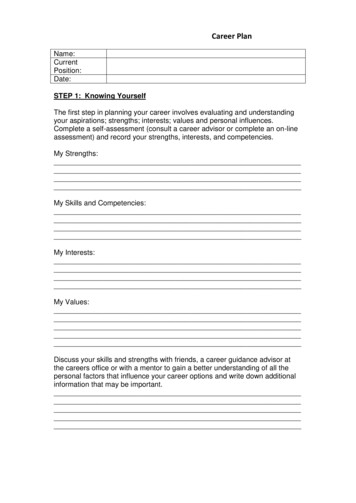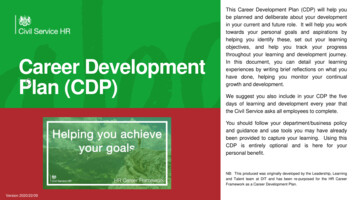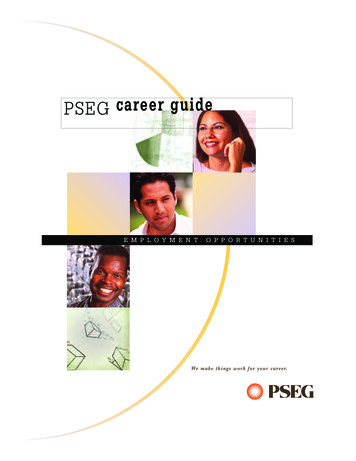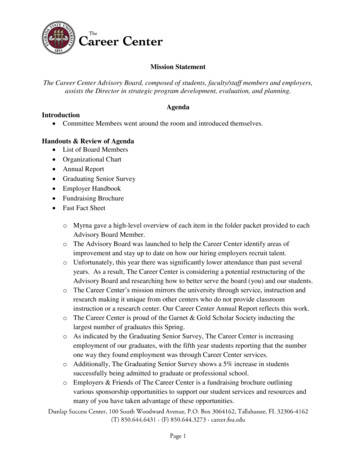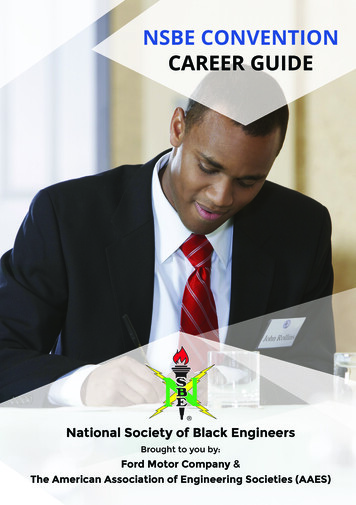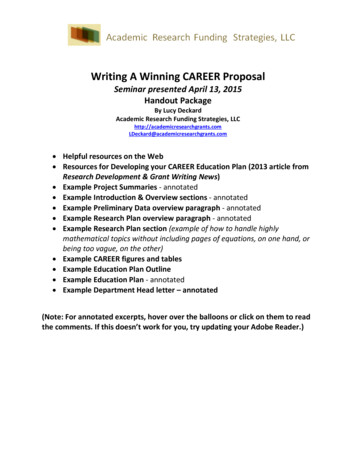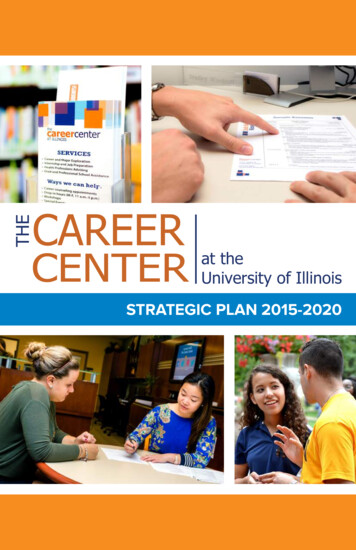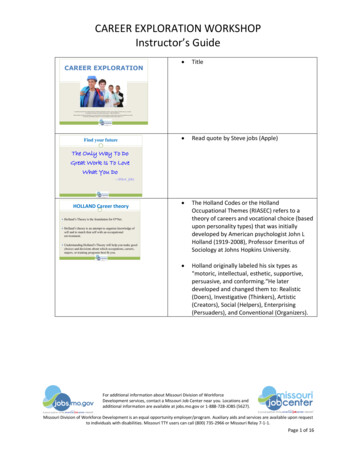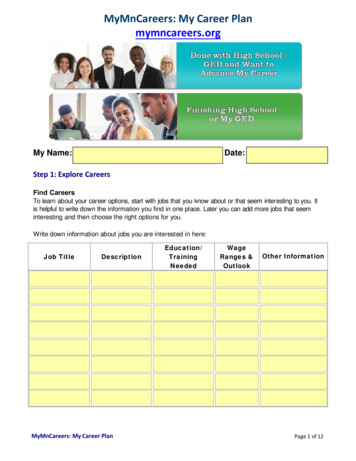
Transcription
MyMnCareers: My Career Planmymncareers.orgMy Name:Date:Step 1: Explore CareersFind CareersTo learn about your career options, start with jobs that you know about or that seem interesting to you. Itis helpful to write down the information you find in one place. Later you can add more jobs that seeminteresting and then choose the right options for you.Write down information about jobs you are interested in here:Job TitleDescriptionMyMnCareers: My Career PlanEducation/TrainingNeededWageRanges &OutlookOther InformationPage 1 of 12
Step 2: Set GoalsKnow Your ValuesValues are beliefs that are important to you. Thinking about your values will help you answer thequestion, “Who am I?” The better you know yourself, the easier it will be to find a career that matchesyour values and skills.Do an exercise that helps you find your top values, such as the one on the “What Is Important to Me?”page.Directions: Write down your top five values here:ValueWhy It Is Important To MeKnow Your SkillsYou should know which work-related skills you already have and how good you are at each. Then,use MyMnCareers to find occupations that match the skills you want to use.Directions: Write down ten skills you have and can use on a job. Your list can include transferableskills.My Top 10 SkillsMyMnCareers: My Career PlanPage 2 of 12
Know Your Skills (continued)Directions: Use the “Find Careers” tool on the MyMnCareers website to learn which skills areneeded for specific jobs. Write down careers that match your skills in the table below.Careers that Match My SkillsMyMnCareers: My Career PlanPage 3 of 12
Know Your InterestsLike skills, you should know which types of activities interest you. Use the activities listed below to helpmatch your interests to jobs.Directions: (1) Read each statement. (2) Fill in the circle next to the activities that interest you.(3) If you don’t like to do an activity, leave that circle blank. (4) When you are done, add the number of filled-incircles at the bottom of each column.I Like To RIASEC do puzzles work on cars attend concerts, theaters, or art exhibits work in teams organize things like files, offices, or activities set goals for myself build things read fiction, poetry, or plays have clear instructions to follow influence or persuade people do experiments teach or train people help people solve their problems take care of animals have my day structured sell things do creative writing work on science projects take on new responsibilities heal people figure out how things work put things together or assemble models be creative pay attention to details do filing or typing learn about other cultures analyze things like problems, situations, or trends play instruments or sing dream about starting my own business cook act in plays think things through before making decisions work with numbers or charts have discussions about issues like politics or current events keep records of my work be a leader work outdoors work in an office work on math problems help people draw give speechesTotal Each Column:MyMnCareers: My Career Plan000000Page 4 of 12
Know Your Interests (continued)Directions: Add the columns from the bottom of the previous page. Write down the number of filledcircles for each letter here.R RealisticTotal: 0S SocialTotal: 0I InvestigativeTotal: 0E EnterprisingTotal: 0A ArtisticTotal:C ConventionalTotal:00Your 2-3 Letter Holland Code Interest ProfileRecord the interest code letters that you scored highest in below.RIASECRealistic people are DOERS.They are often good at mechanical or athletic jobs. They like to work with things like machines, tools, orplants, and they like to work with their hands. They are often practical and good at solving problems.Investigative people are THINKERS.They like to watch, learn, and solve problems. They often like to work by themselves, tend to be good atmath and science, and enjoy analyzing data.Artistic people ar e CREATORS.They like to use their creativity and come up with new ideas. They usually want to work with fewer rules orless structure. They enjoy performing (theater or music) and visual arts.Social people are HELPERS.They like to work directly with people rather than things. They enjoy teaching, counseling, or curing others.They are often good public speakers with helpful, kind personalities.Enterprising people are PERSUADERS.They like to work with other people. They often like to influence, persuade, or perform for people. They liketo lead. They tend to be assertive and enthusiastic.Conventional people are ORGANIZERS.They are very detail-oriented and like to work with data. They are often organized and good with numbers.They are also good at following instructions. They also like working in structured situations.Match Your Interests to CareersDirections: Use MyMnCareers, other websites, or talk to your teachers or job coaches to help youfind careers that match your interests. Write down occupations that match your interests here.Careers that Match My InterestsMyMnCareers: My Career PlanPage 5 of 12
Put Your Assessments TogetherDirections: Look at the jobs you wrote in the “Careers That Match My Skills” and the “Careers ThatMatch My Interests” exercises. List the careers that are on both lists. These careers are more likely tobe a good fit for you. You also want to consider careers that match your values. Finding out more aboutthe careers listed below is a good step to add to your career goals.Careers That Match Both My Skills and InterestsMake Short-term GoalsA short-term goal is something you want to do this week, this month, or this year. Short-term goals helpyou think about what you can do right away to better your career or education. Short-term goals can besteps to completing a long-term goal.Directions: Write down some of your short-term goals here. Keep track when you complete a goal andmake new goals for yourself.Name of Short-term GoalMyMnCareers: My Career PlanWhat I Need To Get DoneDate Goal WillBe CompletePage 6 of 12
Make Long-Term GoalsA long-term goal is something you want to accomplish or complete next year or many years from now.Long-term goals require time and planning. Sometimes it takes many steps to complete a long-termgoal. These smaller steps can be your short-term goals.Directions: Think about and write down your long-term goals below. They could include career,education, financial or personal goals. You may not have goals in each area. Make sure each goal isSMART. S Specific M Measurable A Achievable R Realistic T Time-basedAreasMy Long-Term GoalsWhen WillGoal ers: My Career PlanPage 7 of 12
Matching Long- and Short-Term GoalsDirections: Use all the information you gathered in this career plan. Write down the short-term actionsyou need to do to complete a long-term goal. Update this worksheet when you move forward in yourcareer planning.My long-term goal is:I will do this shortterm action:By thisdate:I will use these resources:I will rewardmy successby:I will re-evaluate my plan and goals on this date:MyMnCareers: My Career PlanPage 8 of 12
Step 3: Get TrainingSearch for Training OptionsTo make good decisions about school, research your options. Then, use MyMnCareers to find out about college programs, short-termtraining, and apprenticeships.Directions: Use the tables below to track your research on schools or programs. First, choose a career goal, then look for trainingprograms that help prepare you for that career.Career Title:School orProgram NameType of Training(Degree, license,certification, etc.)MyMnCareers: My Career PlanServices for StudentsLength ofTrainingCosts,“Must Haves” to EnrollPage 9 of 12
If you are looking at more than one career, make a new worksheet for each one.Career Title:School orProgram NameType of Training(Degree, license,certification, etc.)MyMnCareers: My Career PlanServices for StudentsLength ofTrainingCosts,“Must Haves” to EnrollPage 10 of 12
Step 4: Learn MoreDevelop Work SkillsWork skills are things that you can do at your job. You already have many skills. There are also newskills you can learn.Directions: Write down the skills you have and how you might use them.Skills I HaveHow I Can Use It At Work or SchoolDirections: Write down skills that you want to learn to help you with your career.Skills I Want to LearnMyMnCareers: My Career PlanHow I Can Learn This SkillPage 11 of 12
Making DecisionsDirections: Think of a decision you need to make about your education or career. Write that situation on the“problem” lines below. Write your criteria in the boxes across the top. Fill in your alternatives in boxes going down theleft side of the table. Then follow the PACED process to help you make a decision.1. P Define the Problem. Why do you have to make a choice?2. A List the Alternatives. What are my possible choices?3. C Determine the Criteria (rules for evaluating or testing options). What makes one option better thananother? What are the important things to think about?4. E Evaluate the alternatives. How well does each option meet the criteria?5. D Make the Decision. Which option is the best for me right now?The Problem:CriteriaAlternativesThe Decision:MyMnCareers: My Career PlanPage 12 of 12
MyMnCareers: My Career Plan. Page 7 of 12 . Make Long-Term Goals . A long-term goal is something you want to accomplish or complete next year or many years from
